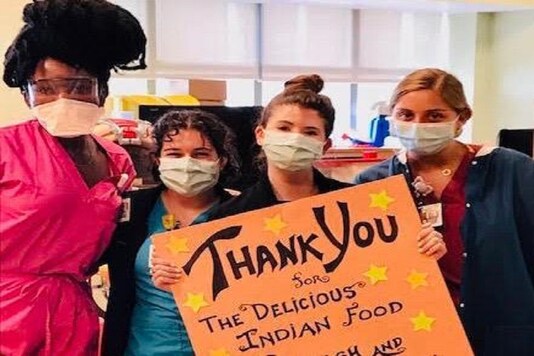
Covid-induced uncertainty, the ensuing economic upheaval and tightening of immigration policy make the American dream suddenly seem distant.
On any given day, hundreds of thousands of residents of the state of New Jersey leave their homes in the morning to cross the waters and head to New York City for their daily commute, manoeuvring crowded suburban trains, stations, jammed bridges and tunnels. But not so much these days. Like almost everywhere else, the highways are empty, the tunnels are unclogged and the bridges are a breeze. The daily journey, however, has not stopped for the “essential” service folks. They are still up on those chilly mornings, trekking across the Hudson River that separates the two states.
Dr Prakash Satwani, a pediatric haematologist-oncologist, is making that journey every single day. He is an associate professor at Columbia University Medical Center in New York City treating Covid-19 patients. He and his wife Sunita, also a doctor, contracted the infection in the line of duty. But that only deepened his resolve to help others deal with the challenge. He teamed up with the effort launched by a fellow New Jerseyan Sonalika Ahuja who through the platform NYUPLIFT has been coordinating the delivery of meals to frontline workers to several hospitals across New York City.
Efforts like these are taking shape across the country and helping the Indian diaspora pull through these tough times. As of May 9, the number of Covid-19 cases had touched 1.3 million in America and the death toll has risen to over 78,000. From Seattle in Washington State to Chicago, Illinois to Atlanta, Georgia communities are stepping up to limit the damage, offer solace and hold everybody together. Campaigns to address hunger, counselling services for stranded fellow-Indians, free legal advice are being offered, besides fundraising initiatives to help the needy. Attorneys from one leading legal firm, which was started by an Indian-American and has a global presence, are providing pro-bono help like never before.
All this while, the American economy is teetering from unprecedented job losses. Twenty million jobs were reportedly lost in the month of April alone with the unemployment rate hovering close to 15%. Among the restaurants that are shuttered, it is suspected that 50% of them, many family-owned, may never reopen. It was reported widely that tech giants like Google and Facebook would be considering letting most employees work from home for the rest of 2020 in an effort to help contain the spread of the virus. A leading insurance company decided to permanently shut down five of its offices and will let thousands of employees work from home going forward.
All this is not welcome news to immigrants in pursuit of secure jobs and stable incomes. As if to add insult to injury, the recent executive order from the White House imposing a 60-day ban on immigration has created widespread confusion among the immigrant community. The notice halting the issue of new green cards is another dampener to the Indian-American dream, especially for many in the tech industry. A group of senators are even urging the President to suspend the OPT [Optional Practical Training] program that is a boon to many students seeking to gain important career skills, experience and potentially a pathway to a job in the United States.
Central-state-city co-ordination is complicated enough during “normal” times. So, it may come as no surprise that there is widespread confusion around the messaging from the federal to the state to the city level. Politics has reared an ugly head too as blames and counter-blames fly between the federal authorities, state governors and city mayors.
In the meantime, Air India has put out its USA schedule of flights to help stranded Indian citizens to head back to their motherland. Flights from San Francisco, Chicago, Newark and Washington DC will take the stranded travellers back to various Indian cities. Consular authorities are working relentlessly to ease the experience. Professionals of Indian origin in medicine, pharma, law, media and other sectors are lending weight to the fight against Covid-19.
While politics, travel restrictions, limited access to resources and family separation are causing pain and anxiety, it is the sense of community, empathetic Americans and the indomitable human spirit that are the saving graces and lifelines during these trying times.
Comment by Aryan Aggarwal: While the onset of the COVID-19 pandemic has strained world efforts to perpetuate human rights, and in some cases, even brought their authenticity into question, the united front of support between the Indian diaspora and other American residents is an indicator that the pandemic isn’t ousting basic human nature. Air India has put out its USA schedule of flights to help stranded Indian citizens to head back to their motherland. Flights from San Francisco, Chicago, Newark and Washington DC will take the stranded travellers back to various Indian cities. While politics, travel restrictions, limited access to resources and family separation are causing pain and anxiety, it is the sense of community, empathetic Americans and the indomitable human spirit that are the saving graces and lifelines during these trying times.
Article compiled by: Aryan Aggarwal, Intern HRDI



